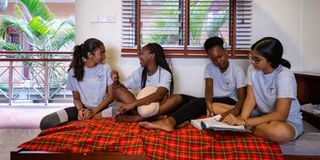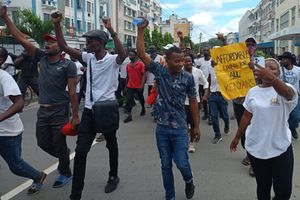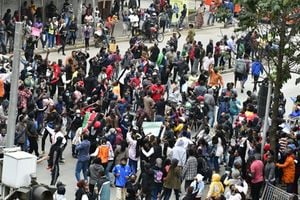Happening now: Liveblog: Kenyan youth stage #OccupyEverywhere protests
Responding to uncertainty during and after Covid-19

Students of Aga Khan Academy Mombasa study before the Covid-19 pandemic struck in March 2020.
What you need to know:
- Our students have come together and forged by a common experience, they have collaborated with and supported one another.
Our reopening process will be informed both by the guidelines of the regulatory bodies in the regions in which we operate and our confidence that international standards of best practice can be met and safely sustained.
As schools around the world reopen their doors for the first time in months following Covid-19 pandemic-instigated closure, the world of education faces a profound reckoning.
Teachers, administrators, policymakers, learners and their parents will face a fundamental change to the learning environment.
While the particularities of this situation slowly begin to crystallise, there is little doubt that the pandemic has acted as both a catalyst and inhibitor, accelerating some trends while slowing others.
It has highlighted the challenges of access and inequality, whether that be in the form of access to electronic devices at home or the varying levels of digital and technological literacy in the household.
But the pandemic has also endowed parents with new and difficult responsibilities and showcased with sharp relief the diversity of circumstances our students and their families now face on a daily basis.
Financial difficulties
For some, financial difficulties present new burdens as parents who may be looking for work must now also support their children’s learning at home.
It has also presented new educational challenges for teachers, students and parents. The shift to online learning, for example, demands familiarity and literacy with a diversity of online tools, applications and programmes. These are skills and competencies which are developed over time, which we cannot expect our students or their families to acquire overnight.
E-learning has also highlighted the importance social and emotional learning plays in the classroom. For students, physical interaction, companionship and communication with one another is essential in strengthening bonds of emotional support. Cultivating these bonds is not easily replicated in the digital world. This has prompted teachers to explore new ways of cultivating a sense of safety and community in this challenging environment.
Question pedagogy
In this broader sense, Covid-19 has provoked us to not only think about and redefine our own definitions of education, but also forced us to question pedagogy in different circumstances. And these are challenges we should welcome with open arms.
Yet where Covid-19 hands out challenges with one hand, it offers opportunities with the other. We find ourselves confronted with a new context and an uncertain future but, in looking ahead, we find ourselves freed from the constraints of the past.
We have witnessed a growing need for a more personalised approach to learning, one that considers additional student voice and choice in how they engage with the curriculum. This is important as it provides students with a sense of structured autonomy over their learning.
Our teachers and staff have developed their technological and digital literacy and use applications that, applied in the appropriate context, enhance the learning experience.
The pandemic has also furthered our understanding of student assessment practices. We have, in line with global best practice, seen an increased need and desire by both learners and teachers for formative assessment.
This is assessment that takes place more frequently on an ongoing basis and is used by the teacher to both adjust their teaching practices and also to gauge the student’s progress.
We have used this time to strengthen our relationships with the parents and guardians of the learners, reaffirming the vital role they play in supporting their child’s education.
As I reflect on our experience, I’m reminded of those at the heart of our network of academies — the learners. There is a saying that it’s not the adversities, which we face, that define us but rather how we respond to them. And how our students have responded!
Our students have come together and forged by a common experience, they have collaborated with and supported one another. They have taken and called for increased ownership and responsibility over their own learning, which, in turn, pushes our teachers to hone their pedagogical skills. They have also extended the hand of care, compassion and respect to those around them.
The safety of our staff and student body is our first priority. The Aga Khan Academies are using international standards to verify and sustain the health, safety and security of all our residential and day students, staff and all on campus.
Our reopening process will be informed both by the guidelines of the regulatory bodies in the regions in which we operate and our confidence that international standards of best practice can be met and safely sustained.
We will continue to aspire to cultivate global leaders who will be prepared to face and respond to the challenges of tomorrow. It is our aspiration that, when equipped with the skills of critical and creative thinking, the ability to open oneself to a diversity of competing perspectives, and the capacity to embody a spirit of curiosity and intellectual humility, our students will be well positioned to lead and enact positive change in the societies where they come from.
There is little that is certain about the state of the world today. However, if I could point to one fact of which I am sure, it is that if the future lies in the hands of our students, the world looks very bright indeed.
Dr Ranger is Director of Aga Khan Academies, [email protected]





